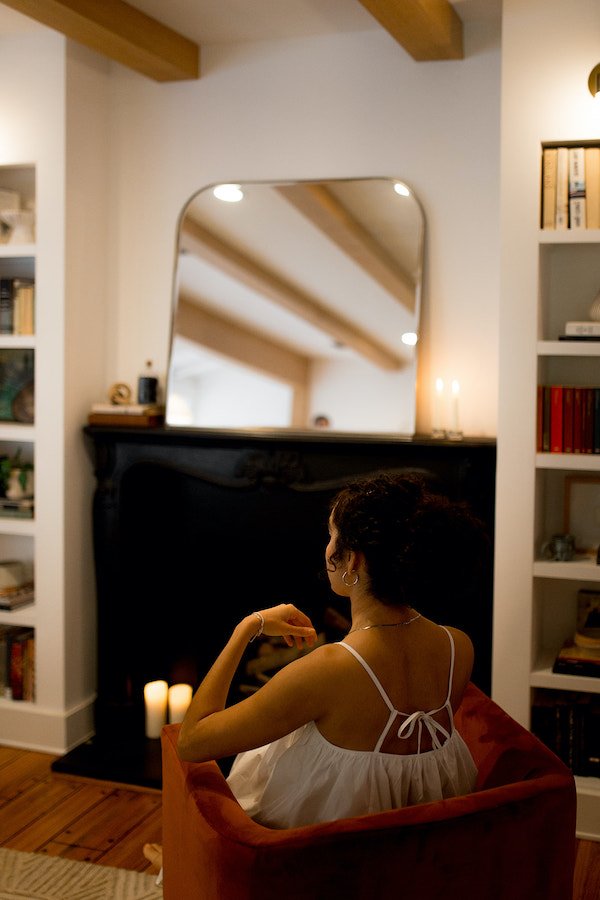
A Practical Guide To Nurturing Your Self-Esteem
“Do you know a woman who’s happy with herself?”
On a recent episode of her newly launched self-titled podcast, former First Lady Michelle Obama asks this to her guest and longtime friend, Dr. Sharon Malone, an OBGYN. Malone pauses; “Off the top of my head?” Obama continues, “I mean, yeah. If you just think about it, do you know any woman who would come in and go, ‘I’m good’? I don’t know one.” Malone didn’t either.
So I thought about it, too. I considered the women in my life—my family, my friends, and the coworkers I’ve kept in touch with long after jobs ended. There are some who I assume have high self-esteem; the question is, would they say the same about themselves? I bet that each one, if asked, would confess to at least one thing they’d change about themselves. But there’s a difference between the desire for betterment, and striving for perfection.
“We should tend to our self-esteem regularly and according to our current conditions.”
Still, as someone more than 20 years Obama’s junior, this discovery did awaken in me the idea that the journey to improving one’s self-esteem is more undulating than it is finite. Maybe we shouldn’t wait to feel and declare, “Yes! I am good! Now and finally!”—but should instead tend to our self-esteem regularly and according to our current conditions. Like a plant!
The next question is, how? (I’m asking this in a whiny, drawn-out tone in my own head.) My challenges with self-esteem manifest most as a lack of confidence and constant comparison. I’ve meditated, journaled, and implemented gratitude practices, but I still frequently find myself clambering for more methods in search of what “sticks” and feels like the most successful solution.
Being encouraged to simply “be more positive” or “stop thinking negatively” without additionally having the tools to do so isn’t always effective. (If we could, we would!) So here are five practical ways to start nurturing your self-esteem, right now.
1. Swap positivity for objectivity
In low moments, I’ve tried saying nice things to myself in the mirror (otherwise known as “positive affirmations”). But I often end up feeling like I’m lying—to my own face. And the smile I force makes me feel like a creepy clown. I cringe, and walk away laughing about how weird it felt. It’s a strange experience.
Luckily, licensed clinical social worker and Chicago-based therapist Rebecca Ogle has made sense of this discrepancy. She specializes in anxiety, codependence, and self-esteem, and reassures that there is, indeed, an alternative way to affirm oneself. “Many people feel uncomfortable saying things that they don’t yet believe or haven’t internalized, as though it is fake or ‘hypocritical’ to do so,” says Ogle. “If [positive affirmations] feel weird and phony to you, if you shudder at the idea of looking at the mirror and saying, ‘I am beautiful, I am smart, I am worthy,’ neutral self-talk is a good alternative.”
Neutral self-talk is steeped in reality. “It isn’t positive or negative, but rather, objective,” Ogle says. “When trying to think of neutral self-talk, just stick to the facts.” Here are some examples she provided:
I’m doing the best I can right now.
Sometimes I fail at things, and other times I succeed.
There are things I don’t like about my body, and other things I do like about it.
I’m no better or worse than anyone else.
I’m drawn to this shift in thinking because it allows us to acknowledge our bad days (or bad feelings) with honesty, instead of disregard. It gives us enough time to honor our emotions, but not enough time to wallow in them.
“[Neutral self-talk] isn’t positive or negative, but rather, objective….just stick to the facts.”
2. Rewrite your story (literally)
Whenever I sit down to journal, what comes naturally is to write a free-flowing description of my current emotions. But oftentimes, it can feel more like I’m documenting a moment in time than comprehending it. I’m venting, but still seeking clarity. The output is effortless, but the yield is unclear—how can I make my writing more revealing?
Stephanie Harrison, who has a Master’s Degree in positive psychology and is the founder of The New Happy, has a suggestion: identify the story that you’re living in—and then rewrite it (literally). “Whose perception of you is driving your behaviors and the way that you treat yourself?” she asks. “Many of us are guilty of allowing our parents, our boss, or even our high school classmates’ perceptions of us to drive our self-image. Healthy self-esteem comes when who you are on the inside and who you are on the outside are aligned.”
“Healthy self-esteem comes when who you are on the inside and who you are on the outside are aligned.”
To help bridge the gap between the two, Harrison offers an exercise. First, imagine you moved to a foreign country where you know no one; think about how you’d behave and spend your time. “If there are major differences, you are probably living by someone else’s story,” she says. Then, set some time aside to write a new narrative, one where you detail what your life would look like five years from now if you were living as your completely authentic self. “Journaling about this can help you start to identify connections between where you are today and where you’d like to be,” she adds.
Begin taking small steps daily to help bring that new story to life and honor your authentic self.
3. Do (more of) what you do well
“We must actively pursue the hobbies we enjoy, invest in the talents we possess, or challenge the fears we have.”
According to “The Self-Conscious Emotions,” when we experience a success, we feel pride in response. The textbook adds that pride (in addition to shame) is the emotion most strongly related to self-esteem. Simply put, to fortify our self-esteem and give it a fighting chance, we must actively pursue the hobbies we enjoy, invest in the talents we possess, or—if we’re brave enough—challenge the fears we have.
Despite how much our mind may try to lead us to believe otherwise, national certified counselor Tanya Peterson of Choosing Therapy says, “We all have unique strengths. These are [the] skills we’re good at and character traits we’re proud of—well, traits that we would be proud of if we were aware of them and allowed ourselves to acknowledge them.” Petersen notes that determining our strengths can be difficult, especially for those of us who hone in on our perceived faults, but insists it takes patience and persistence.
We can also turn to our confidants who see the best in us. “Ask friends and family what they identify as your strengths,” says Petersen. “You might be surprised at the positive things your loved ones think about you, things you might not have ever thought about yourself because your own criticisms have always been so loud.”
Petersen advises to make a list of your skills and strengths, or to keep a journal that you update daily with all the things you did well and the things you are proud of. “Then,” she says, “use them to act. Start with just one of your strengths and, each day, determine how you will use it in your day to accomplish goals, help others, and feel good about yourself.”
“Start with just one of your strengths and, each day, determine how you will use it.”
4. Come prepared for compliments
For whatever reason, saying “Thank you” with a hard, abrupt period after receiving a compliment can feel a little awkward. Whether we fear that our acknowledgement will come across as off-putting hubris or we simply can’t bear to let silence fill the remaining space, we tend to deny, overcompensate, or offer up conditionals instead. If you compliment my outfit, I will explain in detail where I got it from. If you compliment my skin, I’ll be like, “No, I get pimples sometimes!”
To build lasting self-esteem, licensed psychologist Guy Winch says we must learn to accept compliments despite our feelings of uneasiness. And to help combat that awkwardness, he has a tip. He writes for TED Ideas, “The best way to avoid the reflexive reactions of batting away compliments is to prepare simple set responses and train yourself to use them automatically whenever you get good feedback, [like]…’How kind of you to say.’” With practice, Winch says our instinct to reject kind words will eventually fade away, and that that will be evidence of our esteem improving.
5. Give your social media a good sweep
Because this is a piece on self-esteem, I am going to applaud myself—yeah, I said it!—for identifying this one early on. Years ago, I began unfollowing celebrities on Instagram if their M.O. was showcasing a conventionally idealized aesthetic, and if that aesthetic, in turn, made me feel worse about my own body. This wasn’t a slight to them; it was a shield for me. I began following more folks who embraced and exhibited body types more reflective of the average person. (A few of my faves are @palomija, @chloevero, @barbieferreira, and @marquitapring.)
“It’s natural for people to compare themselves to others, and that includes on social media,” says Ogle. “‘Influencers’ with the most followers are often white, tan, thin, and wealthy. Algorithms are biased (because they are created by biased humans) and therefore favor these types of users. There’s absolutely nothing wrong with these types of influencers as individuals—not at all. The problem is that when there is only one specific type of person on our feed, we develop a very narrow view of what success and happiness are supposed to look like.”
These skewed points-of-view can contribute to our feelings of hopelessness and loneliness. But by being mindful of the accounts or hashtags we choose to interact with, Ogle says, “You can begin to widen your scope of who is worthy of happiness.” And by observing a broad variety of people who love themselves and their lives, we can subsequently feel empowered to do the same. “There’s a saying,” she says. “‘You can’t be what you can’t see.’”
Self-esteem can feel elusive and abstract, but there are many belief systems that take similar form and serve as a source of solace. So instead of waiting for our self-esteem to make a single grand entrance, why not open lots of doors for it along the way?
“Instead of waiting for our self-esteem to make a single grand entrance, why not open lots of doors for it along the way?”
How do you nurture your self-esteem? Share in the comments below!
Danielle Cheesman was born and raised in New Jersey, where she lived until moving to Philadelphia to study journalism at Temple University. She has spent her years writing and developing editorial visions for music, art, and lifestyle brands. Now residing in Los Angeles, you can usually find her taking pictures, making playlists, or cuddling her pup. Say hi on Instagram!




